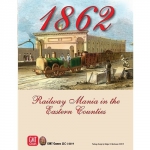-
Załączniki bezpieczeństwa
Załczniki do produktuZałączniki dotyczące bezpieczeństwa produktu zawierają informacje o opakowaniu produktu i mogą dostarczać kluczowych informacji dotyczących bezpieczeństwa konkretnego produktu
-
Informacje o producencie
Informacje o producencieInformacje dotyczące produktu obejmują adres i powiązane dane producenta produktu.Aleph Game Studio
-
Osoba odpowiedzialna w UE
Osoba odpowiedzialna w UEPodmiot gospodarczy z siedzibą w UE zapewniający zgodność produktu z wymaganymi przepisami.
1947 is an 18xx series game set in India from 1836 to 1947, from the birth of the first railway line to the nation’s independence.
The game features 11 companies renowned in the history of Indian railways. Three to five players will open the various railway companies, buy and sell their shares on the market and develop a railway network across India as they compete to become the sub-continent’s richest railway mogul.
1947 offers several unique and challenging new features not found in other 18xx titles.
In the Stock Round players may purchase (and sell), not only the traditional ‘Ordinary Shares’ found in an 18xx, but also ‘Savings Shares’ and Convertible Bonds.
Savings Shares, while still being a 10% shareholding, only count as ‘half’ of a Certificate towards the player’s overall Certificate Limit – with the catch that they also pay out only half of the value of a full dividend.
Convertible Bonds meanwhile, allow a Company to raise additional Treasury funds and for its President to Price Protect their own shareholdings in the Company against sales by other players.
In the Operating Round:
- 1947 introduces the cycle of seasons and its influence on company operations
- the map is divided into two zones (monsoon and dry) which, in combination with the seasons, can reduce the value of the Companies’ routes
- the Companies must each reach their own associated Temple in order to avoid an ongoing reduction in the revenue from their routes
- Companies will be able to link up their track and run trains to Expatriation Sites (marked on the map) in order to obtain bonuses such as money, workers, stock brokers and stock market opportunities.
Workers allow a company’s trains to pass through Cities otherwise blocked by other Companies’ stations, or to place 2 Stations in the same Operating Round, or perform a second tile placement action in an OR, or they can be converted into Stockbrokers.
Stockbrokers allow the Company's Stock Price Token to move either up one row or one space to the right on the Stock Market.
Stock Market Opportunities, on the other hand, represent a discount (not cumulative) to the price paid for an advancement on the Stock Market, but only when an Expatriation Site is reached.
Finally, from the purchase of the first T8 Train, when a Company owns a 2nd train, the total revenue is always calculated by taking the revenue of the highest value train and adding a percentage to the revenue based on the value of the 2nd train.








